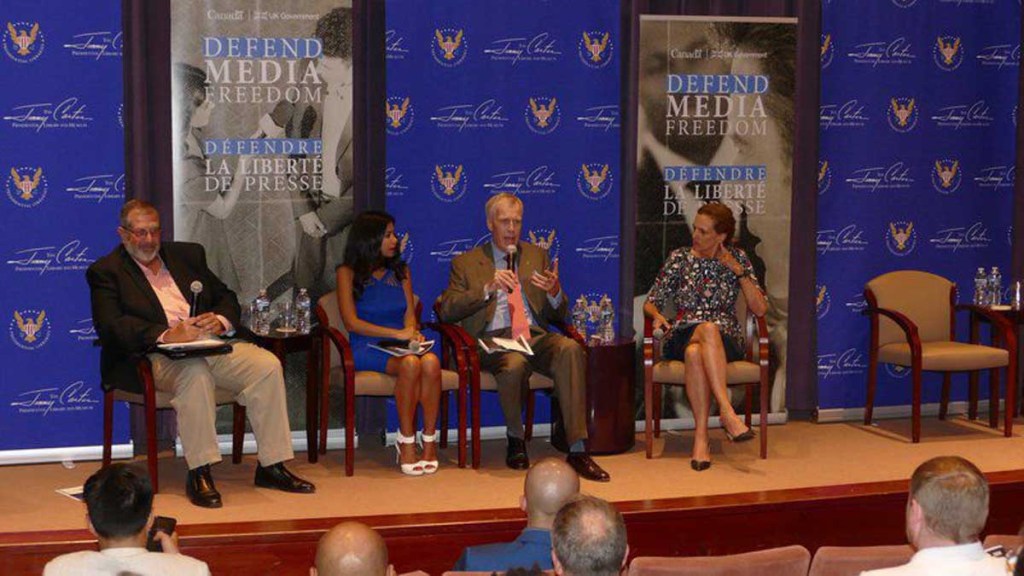U.K., Canada defend U.S. media freedom
Published 4:19 pm Thursday, August 1, 2019

- Photo by John McCosh | Georgia First Amendment FoundationCharles Davis, Paula Rodriquez, Richard Griffiths and Cynde Strand sit on the Defend Media Freedom Panel at the Jimmy Carter Presidential Library and Museum Wednesday. Griffiths talked about assaults on the media and the importance of protecting press freedoms.
ATLANTA — Great Britain and Canada are on the front lines, defending media freedom around the world.
But high-profile journalists and academics here say they are not just worried about oppressive governments and rogue regimes. They are concerned with peril much closer to home.
Trending
They say you don’t have to look beyond the White House or social media to find the most dangerous threats to journalism in the U.S.
British Consul General Andrew Staunton and his Canadian counterpart Nadia Theodore are leading a global charge in defense of a free press at the behest of their respective governments and brought that fight to Georgia Wednesday evening, presenting the Global Pledge on Media Freedom.
Staunton provided copies of the pledge to a crowd of journalists, local government officials, academics and the public at the Defend Media Freedom Panel hosted by the Jimmy Carter Presidential Library and Museum in Atlanta.
He said the document calls on governments across the globe to protect journalists, encourage a free press and to help grow the Global Defense Fund that provides assistance to what the panel calls “journalists in distress.”
Richard Griffiths is president of the Georgia First Amendment Foundation and joined Cynde Strand, executive director of coverage for international news at CNN, and Paula Rodriquez, a 10-time Emmy award-winning journalist, on the panel moderated by Charles Davis, dean of the Henry W. Grady College at the University of Georgia.
Griffiths lamented what he described as media polarization in the U.S.
Trending
“We have become utterly siloed in our perspectives,” he said. “And it becomes OK to vilify the opposite side and characterize them as fake news or propaganda.”
Griffiths, a retired vice president at CNN who ran the media giant’s fact-checking arm for many years, now lectures on press freedom, journalism ethics and public access throughout Georgia, across the nation and around the world.
He said when he speaks to crowds of people who regularly consume their news from CNN, he knows they do not watch FOX News, and when he speaks to people who prefer FOX, he knows they do not watch CNN.
Strand, who early in her career covered the 1989 Tiananmen Square protests and government crackdown resulting in the deaths of hundreds if not thousands of protestors in China, agreed with Griffiths regarding the dangers of the vitriol toward the media.
Griffiths called the First Amendment, which protects the freedom of expression and of the press in the U.S., “our gift.” Strand said rather than a gift, she considers the First Amendment “our duty.”
She said, “I have seen how fragile democracy can be.”
While Telemundo’s Rodriquez talked about threats of violence and personal safety concerns for journalism colleagues in her native Venezuela, Griffiths and Strand talked about more nuanced threats to freedom and democracy.
Strand said President Donald Trump’s fake news rhetoric has been picked up by suppressive governments around the world and spills over into the general public inspiring people on Facebook, Instagram and social media to parrot the media contempt.
“It is a whole new ballgame, people can attack us online and what will that lead to,” she said.
Strand, in a poignant moment during the panel discussion, described how she was protected in China after her crew filmed the tragedy at Tiananmen Square — hidden from authorities by the locals and smuggled to safety in a covered rickshaw — because the protestors knew if journalists from the free world did not report on what was happening no one would.
Theodore, the Canadian consul general, encouraged people not to “consume their media in a bubble.” She said news consumers should turn to established media to get their information and should always consider different points of view.
The most dire warnings came from Davis, the dean at the Grady journalism college.
“Storm clouds are amassing. There are ominous signs,” he said. “There has been strong-arming (of the press) in this country.”
Still, Davis — who before running one of the nation’s top journalism schools had a distinguished career as a journalist and open government advocate — said some of the blame for a misunderstanding of the press lies with the press itself.
“We have to do a better job convincing the public that access rights are public rights, not media rights,” he said.
Griffiths agreed saying he thinks the media is partly to blame. “We need to lift the curtain and show people how we do our jobs to build trust.”
But in the end, Griffiths said the most important thing is that no government or anti-media forces be allowed to suppress watchdog reporting.
“If you take away the oversight role, then systems fall apart because of the corruption of the system,” he said. “Accountability journalism is what holds the glue of our society together.”
The full Global Pledge on Media Freedom, signed at the Global Conference for Media Freedom in London July 10, 2019, can be found at: https://bit.ly/2JIWFCx
British Foreign Secretary Jeremy Hunt and Canadian Minister of Foreign Affairs Chrystia Freeland presented the Global Pledge on Media Freedom, encouraging other nations to sign on at the first-ever Global Conference for Media Freedom in London in mid July. Delegations from more than 100 countries took part in the two-day event.





